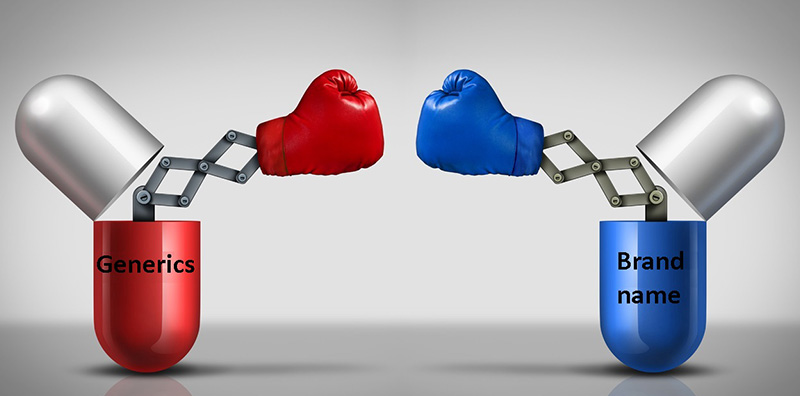
07:18 22nd October 2017 | Proper Medication
Medications Medicines Pharmaceutical Drugs Brand-Name Medications Generic Medications Pharmacological Effects
The following words are interchangeable: medications, medicines and pharmaceutical drugs. The purpose of medication is to diagnose, treat, cure or prevent a disease or condition.
There are brand-name medications and generic medications. Medications can also be classified according to:
The aim of this blog post is to explain the difference between brand-name medications and generic medications.
What are Brand-name Medications?
Brand-name drugs are created for a specific purpose: to have specific pharmacological effects. Dosage and route of administration information should be provided and side effects as well as possible risks should be disclosed.
The biggest difference between a brand-name and a generic drug is that the brand-name drug was invented and produced first, by a pharmaceutical company, with the help of academic scientists and governments. The process and journey is far from easy and exceptionally costly.
Before medications may be advertised and sold they need to be approved by the relevant country’s drug council, control centre or specific administration. To evaluate clinical safety and efficiency, data needs to be submitted and studies need to be performed to provide answers about the medicine’s characteristics. Here manufacturing details, medicine stability, purity and strength are studied.
When a company’s medication receives the thumbs-up, after surviving the rigorous approval process, they benefit from the exclusive rights to advertise and sell their product, until their patent protection expires. This arrangement is essential since the costs involved in the research, development and testing need to be regained as soon as possible to ensure the generation of profit.
In many (if not the majority of) cases, brand-name medications will have (and retain) a higher price tag once generic medications appear on the market.
What are Generic Medications?
A generic medication is a duplicate of an existing brand-name drug. Essentially the active ingredient is the same. They do not take longer to ‘work’ and also have the following things in common:
It is probably safe to say that questions surrounding the use of brand-name versus generic medications generally revolve around affordability, quality and effectiveness. This may be due to a ‘struggle’ between expectation (quality and effectiveness) and financial concerns (under-investing or possible exploitation).
Once a brand-name medicine’s period of exclusivity expires, a generic medicine may be introduced to the market. The generic may also quality for a short period of exclusivity (a few months), but when it is over any manufacturer can attempt to produce another generic. More ‘players’ can drive prices even lower as they compete for sales. Some generic manufacturers merge and if only one is left the generic may end up being more expensive than the original.
The active ingredient(s) have to be the same to achieve the same drug concentrations. Generic medications also have to be as safe and as effective as the original brand. This is true of both prescription as well as over-the-counter medicine.
How are Generics Different?
Healthcare practitioners should encourage patients to switch to generic medications, if they deem the intended effects safe, in order to save their patients money.
Interesting Note: The FDA estimates that 50% of generic drug production is by brand-name companies.
In some cases, it is not 100% possible to achieve the same effect with a generic as with a brand-name product.
“For example if you have a shorter colon or disease that makes food pass through your intestines faster or slower, that might make a difference. Other people are just very sensitive to small changes in blood concentrations and notice a difference.” – C. Michael White, Pharm.D., Professor and Head, Department of Pharmacy Practice, University of Connecticut (via HuffPost)
With narrow therapeutic index drugs (NTI) the same dosages do not necessarily have the same therapeutic effect for everyone (for example anticonvulsants). If blood concentration is too low, it will not be as effective as it should be; if it is too high it can be toxic. A medical practitioner, preferably one familiar with your medical history, should be consulted before changing from a brand-name medicine to a generic or even a different generic if you are already on one. The switching process, which could involve weaning, should be closely monitored.
If you have any questions, or if you want to book an appointment, please don’t hesitate to get in touch:
Email: [email protected]
Call: 01 631 0092 / Whatsapp: +234 (0)810 664 8871.
Visit us at Ikeja, Ikotun, Isolo or Victoria Island
Book an appointment online or search for a clinic close to you.
Book an AppointmentSearch by condition, treatment or keyword and conveniently browse our informative articles